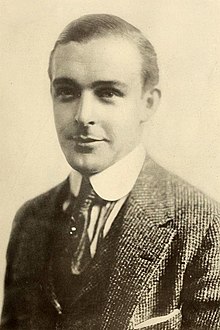Wallace Reid
William Wallace Reid (born April 15, 1891 in St. Louis , Missouri , † January 18, 1923 in Los Angeles , California ) was an American film actor of the silent film era .
Life
William Wallace Reid was born into a family of traveling actors. His father was the vaudeville artist Hal Reid (1862-1920). Even as a child, the boy performed together with his parents. Reid was sporty and musically gifted in his school days and learned several instruments.
Around 1910, Reid's father turned to the burgeoning film industry, pulling Wallace with him, who at the age of 19 made his first film appearance in The Phoenix , an adaptation of a Milton Nobles play , at Selig Polyscope in Chicago . Equipped with a script from his father, Wallace Reid applied to Vitagraph as a director. He was accepted as a screenwriter, cameraman and director and, because of his good looks, was also hired as a leading actor. For example, he played the title role in an early film adaptation of The Portrait of Dorian Gray from 1913. Wallace Reid's career flourished and he worked with greats of the early film, including Allan Dwan . In 1913, while at Universal Pictures , Reid met actress Dorothy Davenport (1895-1977) and married her.
His supporting role as a blacksmith in David Wark Griffith's large-scale production The Birth of a Nation brought him further attention . The following year he also made a cameo in Griffith's epic film Intolerance . Wallace Reid became one of the most popular male actors in Hollywood by the mid-1910s at the latest, and in particular had a female following. He was best known for his role as a heartbreaker, for example in the first film adaptation of Alt-Heidelberg . He shot with film greats such as Gloria Swanson , Lillian Gish , Dorothy Gish and Geraldine Farrar . After having worked in more than 100 film productions, he signed a contract with Jesse L. Lasky and starred in another 60 films for Lasky's Famous Players , later Paramount Pictures . He took on the role of the action hero in numerous films about car racing - for example The Roaring Road (1919), Double Speed (1920), Excuse My Dust (1920), Too Much Speed (1921) and Across the Continent (1922). In 1921 he had one of his greatest successes with The Affairs of Anatol .
Wallace Reid was seriously injured in a car accident while filming The Valley of the Giants (1919). Since the film studio did not want to do without his star, the pain was treated with morphine so that he could finish the film. Reid became addicted to the strong drug, but continued to work incessantly on the production of physically demanding films. In 1922 his health had deteriorated so much that after contracting the flu he fell into a coma and never woke up. He died at the age of 31 and his urn is now buried in the Forest Lawn Memorial Park Cemetery in Glendale , California . In contrast to self-destructive stars like Barbara La Marr , Jack Pickford , and Jeanne Eagels , whose death was also caused by substance abuse, Wallace Reid is a victim of medical ignorance about the side effects of the strong narcotic morphine. Although the drug deaths were regularly concealed by the film studios, his widow Dorothy warned of the dangers of drug addiction on a tour of the USA.
Wallace Reid's contribution to the film industry was honored with a star on the Hollywood Walk of Fame .
Filmography (selection)
- 1910: The Phoenix (short film)
- 1912: The Seventh Son
- 1913: The Picture of Dorian Gray
- 1914: The Avenging Conscience
- 1915: Carmen (Director: Cecil B. DeMille)
- 1915: The Birth of a Nation (The Birth of a Nation)
- 1915: The Golden Chance
- 1915: Enoch Arden
- 1915: Old Heidelberg
- 1916: Joan the Woman
- 1916 intolerance (Intolerance)
- 1917: The Woman God Forgot
- 1919: Hawthorne of the USA
- 1919: The Valley of the Giants
- 1919: The Roaring Road
- 1920: Excuse My Dust
- 1921: Don't Tell Everything
- 1921: The Affairs of Anatol
- 1922: Nice People
- 1922: A Trip to Paramountown
- 1922: Thirty Days
Web links
- Wallace Reid in the Internet Movie Database (English)
- Biography and photos at Golden Silents
Individual evidence
| personal data | |
|---|---|
| SURNAME | Reid, Wallace |
| ALTERNATIVE NAMES | Reid, William Wallace (full name) |
| BRIEF DESCRIPTION | American film actor of the silent film era |
| DATE OF BIRTH | April 15, 1891 |
| PLACE OF BIRTH | St. Louis , Missouri |
| DATE OF DEATH | January 18, 1923 |
| Place of death | Los Angeles , California |


